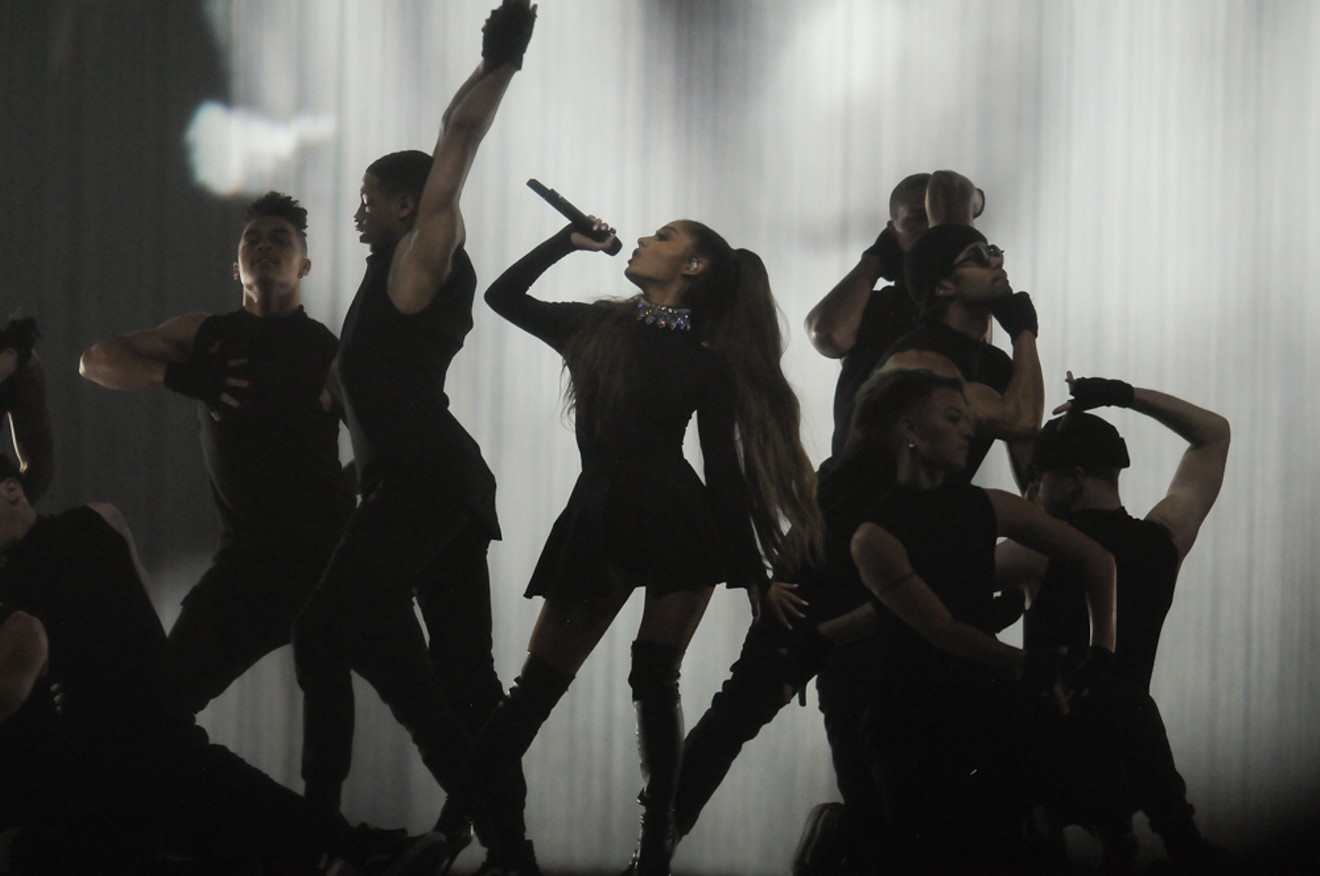Two videos played before Ariana Grande took the stage in Denver Thursday night, her first trip back to Colorado since a deadly bombing at her May 22, 2017, concert in the U.K. The first was part of her hashtag-thankunextgen get-out-the-vote campaign; the other was a charming behind-the-scenes look at the preparation for the tour’s opening night.
The short documentary celebrated her collaborators, gave fans a window into the difficulties of putting on an arena show, and chronicled how many texts crew members exchanged in the minutes before she hit the stage. The video was a generous way to thank everybody involved and seemed gracious — until it didn’t.
Turns out, it was a T-Mobile ad, and all that authenticity had been exploited by a cell-phone company.
This is hardly the first time a corporation has capitalized on music fans. But it seems particularly crass as I think about Grande’s fans, who managed to sing along and dance while witnessing the majority of the concert through their cell-phone screens and tamping down anxieties about their safety.
It’s hard to say how many of those fans couldn’t stop thinking about the Manchester bombing and whether prohibiting bags and radio jammers, which her team now does, made us more or less safe. I couldn’t stop thinking about any of it — about the 22 fans who are no longer with us, about the 800-plus who were injured, and about the other tragedies music fans have experienced in recent years, including shootings at the Route 91 Harvest country-music festival and the Pulse Nightclub in Orlando.
These days, entering a crowd, going to school, worshiping and even dancing can all feel dangerous. On edge, we look for the nearest exit, think about where we can hide or what we can turn into a tourniquet or a weapon if need be. We keep tabs on where our friends are and have plans to reconnect over our phones or, if our phones fail, where we will meet in person.
So when a little feel-good attention goes to all the people who make a concert happen — the crew, the dancers, the backing musicians, the promoters, the T-shirt designers and peddlers, the security, the fans — it’s hard not to loathe a corporation that steps in and says all this magic happens because of our product.
But when “Dang!” by Grande’s ex-boyfriend Mac Miller, who died of an overdose last September, took over the speakers around 9:30 p.m., signaling her show was about to begin, my irritation with T-Mobile faded. All I could think about was her loss and what it must be like for her to hear his voice before she performs.
How does she do it? How does she get on stage, change from one outfit to another, and belt out Aretha Franklin-worthy vocals, comforting her fans when she’s facing her own grief? How does she stick to elaborate choreography when her concerts are now shrouded in the memory of a terrorist attack?
Plenty of artists have their struggles, and most wallow in them. There are the bad breakups, bouts of depression, family drama, benders, artistic insecurities, bullies and trolls, and all the ups and downs and petty squabbles that come with success. Songwriters digest pain through their music; musicians heal while playing.
But aren’t Grande’s issues bigger than all that? After all, she survived a bombing at her own show and lost her longtime ex to an accidental overdose after years of warning him to straighten up and watching him implode.
Grande’s issues are status quo for Generation Z. The mass killings. The overdoses. The suicide epidemic. The mental illness. When she implored Denver to “keep breathin’” and reminded herself she needs to “keep breathin’” again and again, her fans understood that she is up to her neck in trauma with them.
A few days before her Denver concert, headlines declared that Grande had cried on stage during one of her shows. Speculations rumbled about the state of her mental health, as though she could be anything but pulverized after all she’s been through.
Breaking news: She didn’t cry in Denver. She hit her cues, marks and notes. She delivered flawlessly with the physical precision of a robot, making her way through much of Sweetener and thank u, next like she was more playlist than artist. Even so, her humanity flooded from her voice.
And the whole show was peppered with resistance to the religious right and to patriarchy. When she and her dancers first rose to the stage, in a tableau reminiscent of Leonardo da Vinci’s “Last Supper,” singing “God Is a Woman,” they turned Christ's table into an orgy of modern dance. She again spit at the patriarchal right when she and her dancers closed the show, waving small rainbow flags after singing “thank u next."
She didn’t have much to say to Denver, other than telling us it was one of the best of the 49 shows she’s played on this tour and thanking us profusely for being there...standard stuff. But showing up for her concerts comes with a sense of risk; everybody knows things went bad before and it could happen again. Despite the fear, she and her fans continue to take the chance to connect, to share in joy, grief and pleasure through music, to breathe.
Even T-Mobile couldn't ruin that.
[
{
"name": "Air - MediumRectangle - Inline Content - Mobile Display Size",
"component": "12017618",
"insertPoint": "2",
"requiredCountToDisplay": "2"
},{
"name": "Editor Picks",
"component": "17242653",
"insertPoint": "4",
"requiredCountToDisplay": "1"
},{
"name": "Inline Links",
"component": "18838239",
"insertPoint": "8th",
"startingPoint": 8,
"requiredCountToDisplay": "7",
"maxInsertions": 25
},{
"name": "Air - MediumRectangle - Combo - Inline Content",
"component": "17261320",
"insertPoint": "8th",
"startingPoint": 8,
"requiredCountToDisplay": "7",
"maxInsertions": 25
},{
"name": "Inline Links",
"component": "18838239",
"insertPoint": "8th",
"startingPoint": 12,
"requiredCountToDisplay": "11",
"maxInsertions": 25
},{
"name": "Air - Leaderboard Tower - Combo - Inline Content",
"component": "17261321",
"insertPoint": "8th",
"startingPoint": 12,
"requiredCountToDisplay": "11",
"maxInsertions": 25
}
]













